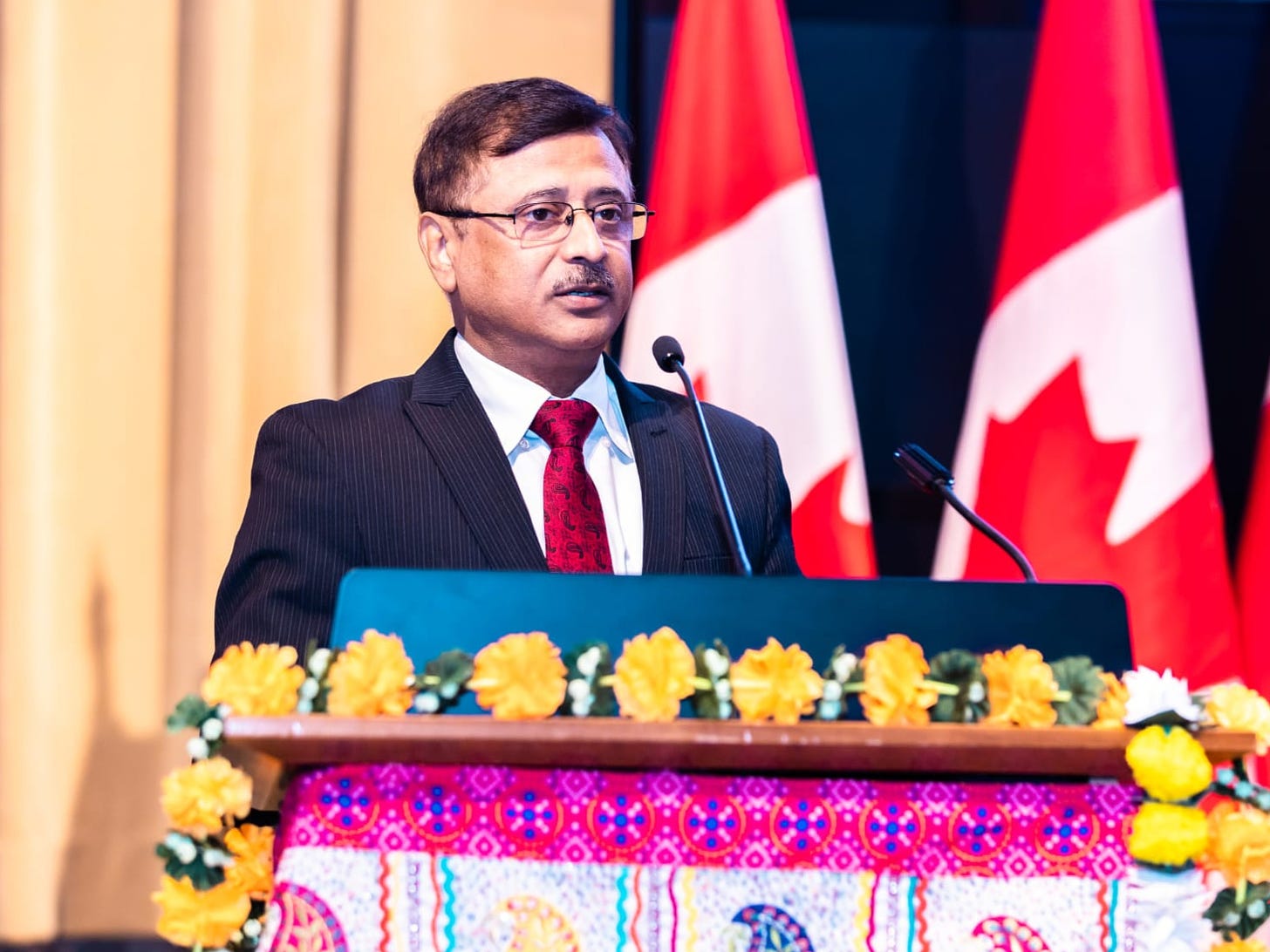Trudeau Touts Indo-Pacific Strategy in ASEAN, Canada and India Expel Envoys
Prime Minister Trudeau attends ASEAN summit to trumpet greater attention towards Asia as Ottawa accuses New Delhi of orchestrating killings across Canada.
This week's edition of IPD's Canada-China Brief covers recent developments in Canada’s engagements in the Indo-Pacific region, including Prime Minister Trudeau’s visit to Laos for ASEAN’s annual summit, the diplomatic expulsions between Canada and India over accusations of a government-led assassination campaign, and more.
From Our Experts
On Trudeau’s participation in ASEAN’s annual summit:
Hugh Stephens
Advisor, Institute for Peace & Diplomacy
Prime Minister Trudeau's personal participation in the ASEAN summit is to be welcomed. Direct participation is important to demonstrate Canada's ongoing commitment to engagement with the region, especially at a time when there are a number of other issues on his domestic and international agenda.
This is a fraught time for ASEAN, especially with regard to its relationship with China. Some ASEAN states, notably host Laos and Cambodia, maintain very close — almost too close for comfort — relationships with China while others, the Philippines and Vietnam in particular, have a more tense relationship. This is primarily because of territorial disputes in the South China Sea and China's recent aggressive behaviour .
Canada's engagement will be welcome to ASEAN member states in terms of bringing in an additional, credible, partner. Canada has a modest but not unimportant military role to play in helping to keep South China Sea transportation corridors open for free navigation, and can also play a helpful diplomatic role in terms of support for ASEAN centrality and independence. Finally, ASEAN and its key member states have growing potential as business and investment partners for Canada.
On Ottawa’s responses to foreign interference:
Zachary Paikin
Senior Fellow, Institute for Peace & Diplomacy
Canada's responses to the Chinese and Indian interference scandals have not been identical, but they do share a common theme: Canada is having great difficulty navigating the realities of a multipolar world.
Over the past 30 years, Canada has grown accustomed to the realities of a West-centric world: one where the G7 largely called the shots and the "liberal international order" was the name of the game. In such a world, Canada could afford for its foreign policy to be, at least in part, the byproduct of domestic diversity management and diaspora politics. In today's world, however, this approach has left Canada with an Indo-Pacific strategy that already comes across as a dead letter, an incoherent Middle East policy that has poured gas on the flames of domestic disorder, and an approach to Ukraine that has privileged illiberal forces — including the TIFF, Hunka, and Memorial to the Victims of Communism fiascos — over Canada's historic commitment to peace and diplomacy.
Going forward, rising powers are going to be increasingly ruthless in the pursuit of their core interests. Countries around the world are hedging against the risks that this brings by developing multi-vector foreign policies — something that Canada has largely failed to accomplish. This calls for a period of consolidation and recalibration in Canadian foreign policy. The focus over the medium term should be to articulate a set of limited but clearly defined national interests on the world stage that can earn multi-partisan backing, paired with an aggressive campaign to rally Canada's diverse ethnocultural communities behind this shared vision.
On diaspora politics in Canadian foreign policy:
David Carment
Senior Fellow, Institute for Peace & Diplomacy
On the same day Ottawa declared the international Palestinian prisoner advocacy organisation, Samidoun, a terrorist entity, it confronted allegations concerning Delhi’s hand in directing the targeted assassination of three Canadian citizens. Diaspora politics figures prominently in both cases. In the former instance, the pro-Israel constituency has pressed elected officials for years to make a decision on Samidoun. In the latter case, it has been the Modi government that has been insistent that Ottawa clamp down on anyone engaged in Khalistan separatism or even advocacy for that matter.
Delhi has had little success in bringing Ottawa on side, arguing that Canadian politics gives extremism, and separatism, a certain legitimacy, in the name of “free speech.” Indeed, in 2012, PM Harper was asked by the Indian government to denounce Sikh aspirations for a separate state, something he would not do. Leveraging diaspora competencies to secure a free trade agreement with India has been a longstanding goal of both the Conservative and Liberal governments. But currying favor with diaspora groups is double-edged.
As confrontations with India, Russia, and China continue unabated, it is becoming increasingly clear Ottawa has a double standard regarding which countries are allowed to interfere in domestic affairs versus those that are not, and which diaspora groups should have the ear of elected officials and those that should not. Canadian governments should not be instrumentalizing ethnic constituencies for political gain. For diaspora groups, it creates unevenness in outcomes and inequality in access. There is a paucity of evidence that catering to specific groups strengthens Canada overall, and now, as is plainly evident, it puts our economy and our security at risk.
Top Stories
Amid Assassination Row, Canada and India Expel Top Envoys
Culminating a year-long diplomatic crisis over the assassination of a Canadian citizen by the Government of India, this week Ottawa expelled its envoys over what it says was the High Commission’s non-cooperation with law enforcement and additional violence masterminded by New Delhi. Denying the allegations, India has expelled Canada’s remaining top diplomats in the country.
‘Only one choice’ — In a press conference, Prime Minister Trudeau tied the move to a multitude of RCMP investigations into murders and violence across Canada:
“Despite repeated requests to the Government of India, they have decided not to co-operate. Given that the Government of India still refuses to co-operate, my colleague, the Minister of Foreign Affairs, Mélanie Joly, had only one choice… the evidence brought to light by the RCMP cannot be ignored.”
In a statement, Global Affairs Canada announced the expulsion of six Indian diplomats and consular officials, notably after “India was asked to waive diplomatic and consular immunities and to cooperate in the investigation” to which “India did not agree” and withdrew the officials concerned.
Foreign Affairs Minister Mélanie Joly stated that “we don’t want diplomatic confrontation with India… we are asking India to cooperate with the investigation — period,” adding that “it is sitting diplomats that were involved” and that “the violence actually increased following the allegations a year ago.”
A senior official told the Globe & Mail that Canada had informed India’s National Security Adviser Ajit Doval and Home Affairs Minister Amit Shah of evidence implicating India, with further proof of the High Commissioner’s direct involvement in the plot leading up to Hardeep Singh Nijjar’s assassination.
RCMP speaks out — This week’s events came after the Royal Canadian Mounted Police released an ‘extraordinary’ statement on the extrajudicial campaign:
Making public a 'multidisciplinary team’ formed to coordinate investigations on the matter, it said it had “learned a significant amount of information about the breadth and depth of criminal activity orchestrated by agents of the Government of India, and consequential threats to the safety and security of Canadians.”
Citing a range of homicides, extortions, and more, the RCMP went on to reveal Deputy Commissioner of Federal Policing Mark Flynn attempted and failed to meet with Indian counterparts to discuss the use of targeted violence and organized crime aimed at the South Asian community in Canada.
In an escalation, Flynn had to be joined by National Security and Intelligence Advisor Nathalie Drouin and Deputy Foreign Affairs Minister David Morrison to present evidence to Indian officials of violent extremism, Indian government-directed homicides, and “interference into democratic processes.”
In a press conference, RCMP Commissioner Michael Duheme and Assistant Commissioner Brigitte Gauvin identified the Khalistani movement as a specific target of New Delhi, acknowledging eight arrests in Canada tied to murders and another 22 to acts of extortion, but not specifying the number of investigations.
Officials anonymously told CBC that investigations encompassed a series of Sikh-Canadian murders, including one just two days after Trudeau had announced his initial accusations against India last year and who had been named by India's National Investigation Agency, and another that had also killed a target’s child.
India strikes back — In an extended response from the Ministry of External Affairs, New Delhi rejected the allegations and went on to expel six Canadian diplomats:
It stated that it rejected Canada’s “preposterous imputations and ascribes them to the political agenda of the Trudeau Government that is centered around vote bank politics,” asserting that Ottawa “has not shared a shred of evidence with the Government of India, despite many requests from our side.”
Saying Trudeau’s cabinet “included individuals who have openly associated with an extremist and separatist agenda regarding India,” New Delhi added that “his Government was dependent on a political party, whose leader openly espouses a separatist ideology vis-à-vis India,” referring to NDP Leader Jagmeet Singh.
Referring to Khalistani separatism, it went on to say that Canada has “consciously provided space to violent extremists” that have threatened Indian diplomats… Multiple extradition requests from the Government of India in respect of terrorists and organized crime leaders living in Canada have been disregarded.”
An Indian official, anonymously commenting on Trudeau’s brief encounter with Prime Minister Narendra Modi in Laos last week, said that bilateral ties “cannot be repaired unless the Canadian Government takes strict and verifiable action against those who actively pursue anti-India activities.”
What commentators think — Many observers appear to have arrived at the conclusion that there is no easy path forward for bilateral relations:
Roland Paris, Director of the University of Ottawa’s Graduate School of Public and International Affairs, stated that “India is wrong if it thinks this problem is going away. More information will come to light in court cases, not just in Canada but likely in the U.S. too. This isn't going away.”
Saira Bano, Assistant Professor at Thompson Rivers University, suggested New Delhi “may have calculated that India’s strategic value to the West would shield it from criticism over its handling of pro-Khalistani activists” but that Canadian ties would suffer “without a shared understanding of the pro-Khalistan issue.”
Harsh Vardhan Shringla, former Foreign Secretary of India, argued that “people will see the government of India standing up to intimidation and coercive measures applied by a developed country” and that “the public will strongly back Prime Minister Modi and the government."
In Laos, Trudeau Touts Indo-Pacific Strategy Before ASEAN Leaders
Trudeau flew to Vientiane last week to attend his third ASEAN annual summit and undertake his first official visit to Laos. There, he trumpeted Canada’s Indo-Pacific Strategy, increasing naval presence in the South China Sea, and Ottawa’s support for the rules-based international order as the two sides also held the ASEAN-Canada Special Summit.
Touting Canada’s role — Trudeau met with counterparts from Thailand, Laos, the Philippines, Malaysia and more during the regional bloc meetings:
In a pre-visit summary, the Office of the Prime Minister underscored the Strategic Partnership signed by both sides last year as well as his plans to highlight “Canada’s constructive role in addressing new and emerging challenges to peace and security.”
After the summit, Ottawa highlighted new moves to upgrade its missions in Laos and Cambodia to full embassies, efforts on negotiating a Canada-ASEAN free trade agreement, and a $128 million package of deliverables including support for law enforcement cooperation and climate change initiatives.
In a Joint Leaders’ Statement, both sides expressed shared commitments to an “ASEAN-centred, open, inclusive, transparent, resilient, and rules-based regional architecture that upholds international law” as well as Canada’s intent to ensure its 2025 G7 presidency will be “informed by the views of ASEAN Member States.”
Together but apart? — An increasing emphasis on Canada’s security engagement was an emergent theme in Canada’s participation in the summit:
On security, the joint statement honed in on agreement to “promote maritime security and safety, freedom of navigation and overflight, unimpeded commerce, mutual trust and confidence, the exercise of self-restraint, the non-use of force or the threat to use force, and the resolution of disputes by peaceful means.”
Trudeau also held trilateral talks with Australian and New Zealand counterparts Anthony Albanese and Christopher Luxon, emphasizing both as “key partners to Canada in the Indo-Pacific region and globally, for advancing shared priorities such as peace and security, democracy, the rule of law, and human rights.”
In a bilateral exchange with the Philippines’ President Ferdinand Marcos Jr., the two leaders “expressed concern over increasing tensions in the South China Sea, noting their mutual commitment to regional security and international law” and affirmed Canadian support at sea through the Dark Vessel Detection Program.
Trudeau spoke to the media on the importance of international law and how Canada “demonstrate[s] that every time we send a Coast Guard vessel or a military ship through the South China Sea. It is international waters and needs to be open for all navigation.”
What commentators think — Observers have underscored ASEAN’s persistent efforts at avoiding great power polarization:
Kai Ostwald, HSBC Chair in Asian Research at the University of British Columbia, noted ASEAN’s wish to preserve its autonomy between the United States and China, and observed that "there is still some space to articulate more clearly what Canada's role in the region is.”
Stephen Nagy, Professor at Tokyo’s International Christian University, stated that “none of the countries in the region want to escalate the security tensions within the region, but they do want to have the capabilities to be able to deal with these challenges bilaterally with China.”
Julie Nguyen, Chair of Canada-ASEAN initiatives at the York Centre for Asian Research said that “ASEAN countries understand that the rivalry between the U.S. and China would have to be dealt with delicately. There needs to be a balance that ensure[s]… peace and security in the region.”
What They’re Saying
It is hard not to see Ottawa’s approach to the [Indo-Pacific] as anything other than a total failure. The challenge here is that Canada has little to provide in terms of incentives, aside from foreign direct investment. Canada isn’t a security provider, it isn’t a significant geopolitical actor, and it isn’t a significant strategic power in Asia. The idea that there is regional demand for more Canadian engagement, however, is simply false.
– Jeffrey Reeves, Senior Washington Fellow, Institute for Peace & Diplomacy
Of all the countries [where the Sikh diaspora fled in the 1980s], Canada is the only one where the population is large enough to sway constituencies in domestic politics. India as a 77-year-old modern state was created by the breakup of the country, and it has dealt with several separatist movements since then. So for the Indian state, any individual who talks about separatism is an anathema, and anyone who supports this is seen to be supporting the breakup of the country… There’s a huge difference between the India-Canada relationship and the India-U.S. relationship in every sense. The U.S. has a remarkable ability to engage with countries that don’t get along with each other.
– Aparna Pande, Director, India Initiative, Hudson Institute
Canada is seen at best as a small power with limited leverage. India is an emerging global power fuelled by a surging economy that is being courted by the West to check Chinese ambitions in the Indo-Pacific. It is feeling confident, increasingly flexing its muscles outside its immediate neighbourhood and sparing no effort to protect its perceived national interests. It believes it can get away with bullying Canada – and up until now, it has.
– Vincent Rigby, Former National Security and Intelligence Adviser
If you enjoy our work, please consider contributing:
Image credit: High Commission of India | PMO







